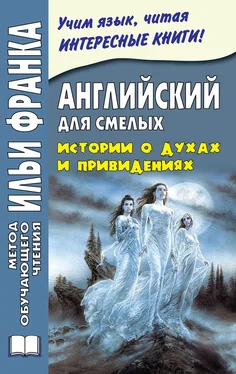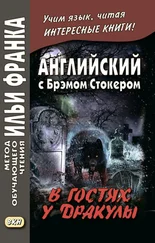‘At dead of night he left the house, and passed into the solitude of the garden(в глухую полночь он покинул дом и прошел в тишину сада) .’

 The words were, ‘to the North, an Ilex’. These three passages, in which he saw no meaning and no connection, began to entangle themselves together in Mr Batchel’s mind. He found himself repeating them in different orders, now beginning with one, and now with another. Any further attempt at reading he felt to be impossible, and he was in no mind for any more experiences of the unaccountable. Sleep was, of course, further from him than ever, if that were conceivable. What he did, therefore, was to blow out the candle, to return to his moonlit bedroom, and put on more clothing, and then to pass downstairs with the object of going out of doors.
The words were, ‘to the North, an Ilex’. These three passages, in which he saw no meaning and no connection, began to entangle themselves together in Mr Batchel’s mind. He found himself repeating them in different orders, now beginning with one, and now with another. Any further attempt at reading he felt to be impossible, and he was in no mind for any more experiences of the unaccountable. Sleep was, of course, further from him than ever, if that were conceivable. What he did, therefore, was to blow out the candle, to return to his moonlit bedroom, and put on more clothing, and then to pass downstairs with the object of going out of doors.
It was not unusual with Mr Batchel to walk about his garden at nighttime. This form of exercise had often, after a wakeful hour, sent him back to his bed refreshed and ready for sleep. The convenient access to the garden at such times lay through his study, whose French windows opened on to a short flight of steps, and upon these he now paused for a moment to admire the snow-like appearance of the lawns, bathed as they were in the moonlight. As he paused, he heard the city clocks strike the half-hour after midnight, and he could not forbear repeating aloud:
‘At dead of night he left the house, and passed into the solitude of the garden.’
It was solitary enough(место было достаточно уединенное) . At intervals the screech of an owl, and now and then the noise of a train, seemed to emphasize the solitude by drawing attention to it and then leaving it in possession of the night(временами уханье совы да изредка шум /проходящего/ поезда подчеркивали, казалось, уединенность /места/, привлекая к нему внимание, а затем оставляя во власти ночи; interval – интервал; at intervals – время от времени; to screech – визжать или кричать пронзительным голосом; ухать / про сову / ; now and then – иногда, изредка, время от времени; possession – владение, обладание ) . Mr Batchel found himself wondering and conjecturing what Vicar Whitehead(мистер Бэтчел осознал, что он размышлял и строил предположения по поводу того, что викарий Уайтхэд; to find – находить, обнаруживать; заставать; to wonder – интересоваться; размышлять; to conjecture – строить догадки, полагать, предполагать ) , who had acquired the close of land to secure quiet and privacy for a garden(который приобрел этот участок земли, чтобы обеспечить тишину и уединенность для сада; to secure – гарантировать, обеспечивать ) , would have thought of the railways to the west and north(подумал бы о железных дорогах, проходивших с запада и с севера) . He turned his face northwards, whence a whistle had just sounded, and saw a tree beautifully outlined against the sky(он обратил лицо к северу, откуда только что раздался свисток /поезда/, и увидел дерево, красиво обрисовавшееся на фоне неба) . His breath caught at the sight(при этом зрелище у него перехватило дыхание; sight – зрение; вид; зрелище ) . Not because the tree was unfamiliar(и не потому, что дерево было ему незнакомо) . Mr Batchel knew all his trees(мистер Бэтчел знал все деревья своего сада: «все свои деревья») . But what he had seen was(но то, что он увидел, было) ‘to the North, an Ilex(к северу – падуб) .’
Mr Batchel knew not what to make of it all(/ уст. / = Mr Batchel didn’t know what to make of it all;мистер Бэтчел не знал, что и думать обо всем этом; to make – зд.: считать, полагать, вырабатывать / мнение /) . He had walked into the garden hundreds of times and as often seen the Ilex(он заходил в сад сотни раз и столько же раз видел этот падуб) , but the words out of ‘The Compleat Gard’ner’ seemed to be pursuing him in a way that made him almost afraid(но слова из «Полного справочника садовода», казалось, преследовали его таким образом, что это /уже/ чуть ли не пугало его; to make smb. afraid – пугать кого-либо ) . His temperament, however, as has been said already, was phlegmatic(однако, как уже говорилось, он был флегматичного склада характера; temperament – темперамент; характер, нрав ) . It was commonly said, and Mr Batchel approved the verdict, whilst he condemned its inexactness(про него говорили, и мистер Бэтчел соглашался с этим мнением, хотя и порицал его неточность; to approve – одобрять; verdict – мнение, суждение; commonly – обычно, общепринято ) , that ‘his nerves were made of fiddle-string’(что «его нервы сделаны из скрипичных струн»; fiddle – / разг. / скрипка ) , so he braced himself afresh and set upon his walk round the silent garden(так что он вновь собрался с духом и отправился на свою прогулку вокруг притихшего сада; to brace oneself – собираться с духом, концентрироваться; brace – связь; скоба, скрепа; to set on / upon – приниматься, браться, приступать; silent – безмолвный, лишенный звуков ) , which he was accustomed to begin in a northerly direction, and was now too proud to change(которую он привык начинать в северном направлении, и гордость не позволяла ему изменить своей привычке: «и был теперь слишком горд, чтобы изменить») . He usually passed the Ilex at the beginning of his perambulation(он обычно проходил мимо падуба в начале своей прогулки) , and so would pass it now(так что теперь собирался его миновать).
Читать дальше
Конец ознакомительного отрывка
Купить книгу


 The words were, ‘to the North, an Ilex’. These three passages, in which he saw no meaning and no connection, began to entangle themselves together in Mr Batchel’s mind. He found himself repeating them in different orders, now beginning with one, and now with another. Any further attempt at reading he felt to be impossible, and he was in no mind for any more experiences of the unaccountable. Sleep was, of course, further from him than ever, if that were conceivable. What he did, therefore, was to blow out the candle, to return to his moonlit bedroom, and put on more clothing, and then to pass downstairs with the object of going out of doors.
The words were, ‘to the North, an Ilex’. These three passages, in which he saw no meaning and no connection, began to entangle themselves together in Mr Batchel’s mind. He found himself repeating them in different orders, now beginning with one, and now with another. Any further attempt at reading he felt to be impossible, and he was in no mind for any more experiences of the unaccountable. Sleep was, of course, further from him than ever, if that were conceivable. What he did, therefore, was to blow out the candle, to return to his moonlit bedroom, and put on more clothing, and then to pass downstairs with the object of going out of doors.









